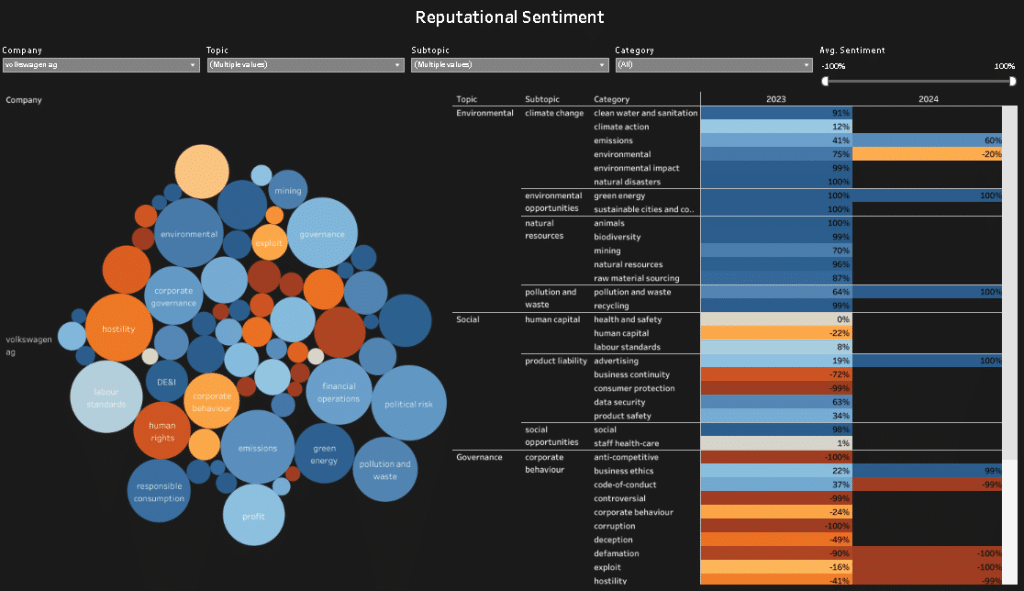Volkswagen, a leading automotive manufacturer, has taken significant steps towards adopting Environmental, Social, and Governance (ESG) principles to drive a greener future. With a focus on sustainable mobility and carbon neutrality, Volkswagen has emerged as a key player in the automotive industry’s transition towards a more environmentally conscious future. By integrating ESG practices into their operations, Volkswagen is setting an example for other companies in the sector to follow. Here we take closer look at Volkswagen ESG score and what it means for the industry.
Importance of ESG in the automotive industry
ESG considerations have become crucial across industries, and the automotive sector is no exception. As concerns about climate change and environmental degradation grow, customers, investors, and regulators are demanding more sustainable practices from companies. By prioritizing ESG factors, such as reducing carbon emissions and promoting social responsibility, automotive companies like Volkswagen can enhance their reputation, attract investors, and meet evolving consumer expectations.
Overview of Volkswagen ESG score
Our Volkswagen ESG score – based on Ai-driven news sentiment analysis – encapsulates its concerted efforts towards sustainability, especially in the wake of the Dieselgate scandal, with a pronounced shift towards electrification and a greener future. The company’s environmental initiatives are underscored by ambitious electric vehicle launches and a commitment to reducing its carbon footprint. Socially, Volkswagen focuses on improving labour practices, enhancing diversity, and ensuring ethical supply chains, despite the industry’s inherent challenges. Governance reforms post-scandal have bolstered compliance and transparency to rebuild trust. Although Volkswagen’s overall ESG performance signals improvement, reflecting its strides in sustainability and governance, the journey towards fully mitigating past issues and embracing sustainable mobility continues, underscoring a complex, evolving ESG landscape.


Volkswagen’s commitment to sustainable mobility and carbon neutrality
Volkswagen has made a firm commitment to sustainable mobility and carbon neutrality. The company aims to become a leading provider of electric vehicles and has set ambitious targets for electrification. By 2030, Volkswagen plans to have electric vehicles account for at least 70% of its European sales. Additionally, the company aims to achieve a fully carbon-neutral balance by 2050, encompassing its entire value chain, from production to the end use of its vehicles.
Volkswagen’s corporate governance score
Volkswagen’s commitment to ESG extends beyond environmental initiatives. The company places great importance on corporate governance and social responsibility. With a robust corporate governance framework, Volkswagen ensures transparency, accountability, and effective decision-making. Furthermore, Volkswagen actively engages in social responsibility initiatives, including community development, education, and philanthropy. By upholding high standards in these areas, Volkswagen establishes trust and fosters long-term relationships with stakeholders. However there is still room for improvement in this area.
To elevate its governance score, Volkswagen should prioritize enhancing board diversity and independence, bolstering transparency in business practices and financial disclosures, and further fortifying its compliance and ethical standards. Strengthening risk management, aligning executive compensation with long-term sustainability goals, actively engaging with stakeholders, implementing robust anti-corruption measures, and regularly updating governance practices in line with evolving best practices and regulations are crucial steps. These efforts will not only improve Volkswagen’s governance score but also rebuild trust among stakeholders, affirming its commitment to ethical conduct and responsible corporate governance in the dynamic automotive industry landscape.
Volkswagen’s social impact score
Volkswagen’s social score of 56 reflects areas in need of improvement, particularly concerning labour practices, product responsibility, and stakeholder engagement. To enhance this score, Volkswagen should focus on fostering a more inclusive and diverse workplace culture, ensuring fair labour practices across its global supply chain, and enhancing safety standards for its products. Additionally, increasing efforts to engage with communities and stakeholders transparently and responsibly will be key. Addressing these areas requires Volkswagen to implement comprehensive social responsibility initiatives, strengthen partnerships with suppliers to uphold ethical standards, and prioritize customer and employee feedback mechanisms. By taking these steps, Volkswagen can improve its social impact, thereby elevating its social score and reinforcing its commitment to social responsibility within the automotive industry.
Environmental management and climate change initiatives at Volkswagen
Volkswagen acknowledges the urgent need to address climate change and has implemented various initiatives to mitigate its environmental impact. The company has established comprehensive environmental management systems to monitor and reduce resource consumption, waste generation, and emissions. Through the use of innovative technologies and sustainable practices, Volkswagen aims to minimize its carbon footprint and preserve the environment for future generations.
Renewable energy adoption and supply chain sustainability
In line with its commitment to sustainability, Volkswagen is actively adopting renewable energy sources to power its operations. By transitioning to renewable energy, such as solar and wind power, Volkswagen reduces its reliance on fossil fuels and helps to decrease greenhouse gas emissions. Additionally, the company ensures supply chain sustainability by partnering with suppliers who adhere to strict environmental and social standards. This commitment to sustainability extends beyond Volkswagen’s own operations, positively influencing the entire automotive supply chain.
Emission reductions and innovation in sustainability
Volkswagen is focused on reducing emissions from its vehicles, both during the manufacturing process and throughout their lifecycle. The company invests heavily in research and development to drive innovation in sustainability. By incorporating advanced technologies, such as regenerative braking and lightweight materials, Volkswagen aims to improve fuel efficiency and reduce emissions. Through continuous improvement and investment in sustainable solutions, Volkswagen is driving the automotive industry towards a greener future.
Ethical business practices and employee welfare at Volkswagen
Ethics and employee welfare are integral to Volkswagen’s ESG initiatives. The company is committed to maintaining the highest ethical standards in its business practices, ensuring compliance with laws and regulations, and promoting fair competition. Volkswagen also prioritizes the well-being of its employees, providing a safe and inclusive work environment, actively working to foster diversity and equal opportunities, and supporting employee development. By prioritizing ethics and employee welfare, Volkswagen creates a positive workplace culture and strengthens its reputation as a responsible employer.
Green manufacturing and sustainable production processes
Volkswagen has implemented green manufacturing practices to minimize its environmental impact. The company focuses on energy-efficient production processes, waste reduction, and responsible use of resources. By optimizing manufacturing operations, Volkswagen reduces energy consumption, lowers emissions, and minimizes waste generation. Through its commitment to sustainable production, Volkswagen demonstrates that environmentally friendly manufacturing practices are not only possible but also essential for a greener future.
Volkswagen’s corporate social responsibility (CSR) programs
Volkswagen actively engages in corporate social responsibility (CSR) programs, contributing to the well-being of communities and addressing social challenges. The company supports initiatives in education, environmental conservation, and social welfare. Volkswagen’s CSR programs aim to make a positive impact on society, aligning with the United Nations’ Sustainable Development Goals. By leveraging its resources and expertise, Volkswagen demonstrates its dedication to being a responsible corporate citizen.
Impact of Volkswagen ESG score & initiatives on the automotive industry
Volkswagen’s ESG initiatives have a significant impact on the automotive industry as a whole. By prioritizing sustainable mobility, carbon neutrality, and social responsibility, Volkswagen sets a benchmark for other companies to follow. The company’s commitment to electric vehicles, emission reductions, and supply chain sustainability encourages the entire automotive industry to embrace greener practices. Furthermore, Volkswagen’s emphasis on ethical business practices and employee welfare sets a standard for corporate behaviour and enhances the industry’s reputation.
Volkswagen ESG score: Peer comparison
To understand how Volkswagen’s ESG score compares to those of its main competitors, let’s consider a few key players in the automotive industry that are often compared with Volkswagen, such as Toyota, Ford, General Motors, and Daimler (Mercedes-Benz Group). These companies, like Volkswagen, are heavily involved in both traditional automotive manufacturing and the development of electric vehicles, which is increasingly becoming a significant factor in ESG evaluations.
Volkswagen’s ESG score
Volkswagen has been working to improve its ESG performance, especially in the wake of the Dieselgate scandal. The company has made significant investments in electric vehicles and sustainable mobility solutions. However, its ESG scores are influenced by its governance structure, environmental impact, and efforts to transition to a more sustainable business model.
Comparison with competitors
Toyota: Often scores highly in ESG evaluations due to its long-standing commitment to hybrid technology and recent pushes into fully electric vehicles. Toyota’s environmental initiatives and strong governance practices generally set a high benchmark in the industry.
Ford: Has been making strides in ESG performance with its commitment to electric vehicles, such as the Mustang Mach-E and the electric F-150 Lightning. Ford’s efforts to reduce its carbon footprint and improve its social and governance metrics are notable.
General Motors: GM has made ambitious commitments to electric vehicles, planning to go all-electric by 2035. GM’s investments in EV technology and sustainable practices are reflected in its improving ESG scores.
Daimler (Mercedes-Benz Group): Daimler has also committed to electrifying its fleet, aiming for electric models to make up a significant portion of its sales by 2030. The company’s focus on innovation, sustainability, and strong governance contribute positively to its ESG rating.
Volkswagen’s position
Volkswagen’s ESG score reflects its ongoing efforts to overcome past controversies and focus on sustainable mobility. While its scores have been improving, it may still lag behind some competitors, especially those like Toyota, which have a longer history of commitment to sustainability. However, Volkswagen’s aggressive push into electric vehicles and sustainable practices is helping to close the gap.
In summary, Volkswagen’s ESG performance is competitive, showing strong improvements and commitments to sustainability that bring it closer to its main rivals. The automotive industry is rapidly evolving, with ESG factors playing an increasingly central role in shaping company strategies and investor decisions.
Volkswagen’s role in driving towards a greener future
Volkswagen’s ESG initiatives and commitment to sustainability position the company as a driving force towards a greener future in the automotive industry. By integrating ESG principles into their operations, Volkswagen demonstrates that environmental stewardship, social responsibility, and ethical business practices are not only necessary but also achievable. Through their efforts, Volkswagen inspires other companies to follow suit, contributing to a more sustainable and environmentally conscious automotive sector.
Find out more
Looking for detailed and granular Volkswagen ESG score data? At Permutable AI, we specialise in providing comprehensive ESG insights to help corporates make informed decisions. If you require in-depth analysis on Volkswagen or other companies in the renewable energy sector, we invite you to get in touch. Please fill in the form below with your specific needs or directly email us at enquiries@permutable.ai. Let’s work together towards a sustainable future.


